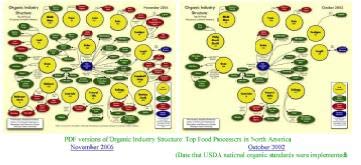|
The basic idea for this collective
adoption of an "Unacceptable
Ingredients List" came as an important "Ah Hah!" moment when we discovered
that Whole Foods Markets (WFM) has a detailed contract with United Natural Foods
Inc (UNFI) that required UNFI (formerly known as Mountain People's
Warehouse) to accept a detailed 'Unacceptable Ingredients List" provided
by WFM, and that "UNFI
agrees it will not knowingly sell WFM Products that contain ingredients
listed on the Unacceptable Ingredient List.".
The Ah Hah! resulted from the collective realization
that when our Coop joined the National Coop Grocers Association (NCGA), we had become part of
a "Coop of Coops" - a chain so large that it was
actually second only to Whole Foods Markets in volume and dollar value,
in the Natural Foods arena, and this opens the possibility that if we could combine OUR
buying power with theirs (which requires a grassroots effort to redirect NCGA from the
bottom up) we would literally have the power to enter into collective bargaining position with
"truly evil" corporations like General Mills (who have defeated local
product labeling legislation efforts in several states), and force them to assure us
that they have actually removed all traces of toxic chemicals
and endocrine disruptors such as BPA from the protective linings used in the cans of food they create under
product names like Muir Glen.
|
The Ownership Octopus

The Structure of The Organic Distribution Network (Top 25)
THE POISON IN OUR FOOD (and CAN linings) IS FINALLY HITTING THE FAN
"The world According to Monsanto"
On March 11 a new documentary was aired on French
television (ARTE – French-German cultural tv channel) by French journalist
and film maker Marie-Monique Robin,
The World According to Monsanto - A documentary that Americans won't ever
see. The gigantic biotech corporation Monsanto is threatening to destroy the
agricultural biodiversity which has served mankind for thousands of years.
ONE HOUR AND FORTY-EIGHT MINUTES
Chemical Linked to Birth Defects Found in Canned Foods
5 MAR 2007 | In the most comprehensive U.S. tests for an industrial chemical used to line cans of food, an independent laboratory found a compound linked to birth defects in more than half of the samples of canned fruit, vegetables, soda, and baby formula from supermarket shelves.
More background science on endocrine disruptors and synthetic estrogens

This website is a comprehensive resource for environmental, health and safety information about bisphenol A (BPA). Bisphenol A is an industrial chemical used primarily to make polycarbonate plastic and epoxy resins – both of which are used in countless applications that make our lives easier, healthier and safer, each and every day.

Research on endocrine disruption has exploded since Our Stolen Future
was published. New results, new syntheses, new policy recommendations
and debates appear, it would seem, almost weekly.
 Cool Photo Tour of tomato processing
plant! Cool Photo Tour of tomato processing
plant!
Tomatoes skins are removed by soaking tomatoes in a warm solution of lye, then rolling them across fast-spinning rollers. The skins become less acidic from the addition of lye. Either citric or hydrochloric acid is added to re-acidify the skins which have become alkaline by the addition of lye. The skins are added into sauces, etc.
Diced tomatoes are treated with calcium carbonate or calcium lactate and sometimes y-irradiated (whatever that is) to preserve firmness. -
- John Barr, PSGC Committee
About Pasteurized Almonds and USDA Stickers on
other Irradiated Foodstuffs

|
|
Our Quality Standards
(Whole Foods Markets)
We carry natural
and organic products because we believe that food in its purest
state — unadulterated by artificial additives, sweeteners,
colorings, and preservatives — is the best tasting and most
nutritious food available.
Our business is to
sell the highest quality foods we can find at the most competitive
prices possible. We evaluate quality in terms of nutrition,
freshness, appearance, and taste. Our search for quality is a
never-ending process involving the careful judgment of buyers
throughout the company.
-
We carefully
evaluate each and every product we sell.
-
We feature
foods that are free of artificial preservatives, colors,
flavors, sweeteners, and hydrogenated fats.
-
We are
passionate about great tasting food and the pleasure of sharing
it with others.
-
We are
committed to foods that are fresh, wholesome and safe to eat.
-
We seek out and
promote organically grown foods.
-
We provide food
and nutritional products that support health and well-being.
Whole Foods
Market's Quality Standards team maintains an extensive list of
unacceptable ingredients. However, creating a product with no
unacceptable ingredients does not guarantee that Whole Foods Market
will sell it. Our buyers are passionate about seeking out the
freshest, most healthful, minimally processed products available.
Quality Standards: Unacceptable Food Ingredients
The following list contains ingredients that Whole Foods Market finds unacceptable in food products. We reserve the right to change this list at any time.
The following list contains ingredients that Whole Foods Market finds unacceptable in food products. We reserve the right to change this list at any time.
- acesulfame-K (acesulfame potassium)
- acetylated esters of mono- and diglycerides
- ammonium chloride
- artificial colors
- artificial flavors
- aspartame
- azodicarbonamide
- benzoates in food
- benzoyl peroxide
- BHA (butylated hydroxyanisole)
- BHT (butylated hydroxytoluene)
- bleached flour
- bromated flour
- brominated vegetable oil (BVO)
- calcium bromate
- calcium disodium EDTA
- calcium peroxide
- calcium propionate
- calcium saccharin
- calcium sorbate
- calcium stearoyl-2-lactylate
- caprocaprylobehenin.
- carmine (see cochineal)
- certified colors
- cochineal (carmine)
- cyclamates
- cysteine (l-cysteine), as an additive for bread products
- DATEM (Diacetyl tartaric and fatty acid esters of mono and diglycerides)
- dimethylpolysiloxane
- dioctyl sodium sulfosuccinate (DSS)
- disodium calcium EDTA
- disodium dihydrogen EDTA
- disodium guanylate
- disodium inosinate
- EDTA
- ethyl vanillin
- ethylene oxide
- ethyoxyquin
- FD & C colors
- fois gras
- GMP (disodium guanylate)
- hexa-, hepta- and octa-esters of sucrose
- hydrogenated fats
- IMP (disodium inosinate)
- irradiated foods
- lactylated esters of mono- and diglycerides
- lead soldered cans
- methyl silicon
- methylparaben
- microparticularized whey protein derived fat substitute
- monosodium glutamate (MSG)
- natamyacin
- nitrates/nitrites
- partially hydrogenated oil
- polydextrose
- potassium benzoate
- potassium bisulfite
- potassium bromate
- potassium metabisulfite
- potassium sorbate
- propionates
- propyl gallate
- propylparaben
- saccharin
- sodum aluminum phosphate
- sodium aluminum sulfate
- sodium benzoate
- sodium bisulfite
- sodium diacetate
- sodium glutamate
- sodium nitrate/nitrite
- sodium propionate
- sodium stearoyl-2-lactylate
- sodium sulfite
- solvent extracted oils, as standalone single-ingredient oils (except grapeseed oil).
- sorbic acid
- sucralose
- sucroglycerides
- sucrose polyester
- sulfites (sulfur dioxide)
- TBHQ (tertiary butylhydroquinone)
- tetrasodium EDTA
- vanillin
Last updated on April 01, 2005
|
|

